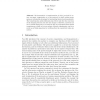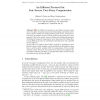14 search results - page 1 / 3 » Partial Fairness in Secure Two-Party Computation |
EUROCRYPT
2010
Springer
13 years 9 months ago
2010
Springer
A seminal result of Cleve (STOC ’86) is that, in general, complete fairness is impossible to achieve in two-party computation. In light of this, various techniques for obtaining...
CTRSA
2008
Springer
13 years 6 months ago
2008
Springer
In the setting of secure multiparty computation, a set of mutually distrustful parties wish to securely compute some joint function of their private inputs. The computation should...
EUROCRYPT
2003
Springer
13 years 10 months ago
2003
Springer
Abstract Benny Pinkas HP Labs Abstract. We demonstrate a transformation of Yao’s protocol for secure two-party computation to a fair protocol in which neither party gains any sub...
CTRSA
2008
Springer
13 years 6 months ago
2008
Springer
In the 1980s, Yao presented a very efficient constant-round secure two-party computation protocol withstanding semi-honest adversaries, which is based on so-called garbled circuits...
CORR
2010
Springer
13 years 3 months ago
2010
Springer
A protocol for computing a functionality is secure if an adversary in this protocol cannot cause more harm than in an ideal computation where parties give their inputs to a truste...


